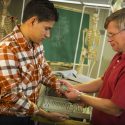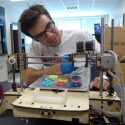Concrete Canoe team victorious in the Netherlands
The University of Wisconsin–Madison Concrete Canoe Team dominated the 30th annual Dutch Concrete Canoe Challenge this weekend in the Netherlands. The team took first place overall, with victories in five out of the six race categories. The team’s 20-foot, 176-pound canoe, Descendent, also won the construction and innovation categories for its design and use of environmentally sound concrete.
Eight members of the UW–Madison team and their adviser, civil and environmental engineering Associate Professor Chin Wu, traveled to Amsterdam for the competition, also known as the Beton Kano Race, which ran from Sept. 7-9. The team was invited to compete after winning the U.S. national championship for the fifth consecutive time in June. The UW–Madison team was one of 12 participating teams, most of which hailed from the Netherlands or Germany.
The American Concrete Institute (ACI) and the American Society of Civil Engineers (ASCE) paid the UW–Madison team’s trip expenses to the race.
UW-Madison College of Engineering Associate Dean Steve Cramer, a professor of civil and environmental engineering, was the team’s 2007 faculty advisor. "It’s a well-deserved trip," he says. "The team was closely knit and very committed. They worked hard."
The competition is an opportunity to remind all students that engineering has become a global field, says Cramer. "It’s important that as many students get international experience as possible," he says. "The success of these students has provided them the chance to gain global experience."
Canoe team project manager David Blodgett, a senior civil and environmental engineering student, says the team "couldn’t be happier" with the competition results. "We owe a big thank-you to ASCE and ACI for funding the trip and being so amazing in helping us get there," he says.
Blodgett said the races were very physical, describing the men’s sprint in particular as a "true battle." At the start of race day, he thought the day was sure to be full of "concrete canoe carnage."
The sprint races were held in a narrow canal with overhead bridges, according to Blodgett. He says the 20 or more European canoes would have been solid contenders in the Great Lakes Regional Conference, but the UW–Madison team was able to pull off decisive victories.
The physicality of the races took its toll on Descendent. After a "brutal T-bone" in the co-ed race, Blodgett says the boat appeared to flex at least four inches and some decorative concrete actually broke off the canoe.
Overall, Blodgett says it was a "great pleasure" to be part of the competition. He also said the canoe team experience in general was positive. "I’ve gained a lot of experience as a leader in terms of motivating and teaching people of all skill levels and backgrounds," he says.
The actual race wasn’t the only event of the trip. Blodgett and team member Ivy Harmon, a fellow civil and environmental engineering student, toured Delft Hydraulics, which the U.S. Congress has consulted on flood protection issues. Blodgett says seeing the latest research in sediment transport, fluid mechanics and water wave theory was "really amazing stuff."
The eight members who traveled to the Netherlands will be able to share the experience with their teammates and the student body as a whole, says Cramer. "It will open everybody’s eyes to a larger world," he says.
Tags: engineering, learning, student life



